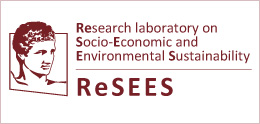26th EAERE Annual Conference: Policy Session: Carbon border adjustment and the EU ETS: challenges and solutions
The 26th Annual Conference of the EAERE will be held from June 23 - June 26, 2021.
It is our pleasure to announce the 26th Annual Conference of the European Association of Environmental and Resource Economists in Berlin in 2021!
The conference is organized by Technische Universität Berlin (TU Berlin) and Humboldt-Universität zu Berlin (HU Berlin). The conference is supported by the wider Berlin research community in environmental and resource economics, most notably by the German Institute for Economic Research (DIW Berlin), and Mercator Research Institute on Global Commons and Climate Change (MCC). The organization of the conference is also supported by the Berlin Chamber of Commerce and Industry (CCI).
23/6
11.00- 13.00
Policy Session: Carbon border adjustment and the EU ETS: challenges and solutions
Description
The 2030 Climate Target Plan has remarkably increased the ambition of the European emission reduction target setting Europe on the path to becoming climate neutral by 2050. To that end, the European Commission is preparing detailed legislative proposals on how this target can be achieved. A review of some key features of the EU ETS as well as of the EU’s climate policy at large is planned in 2021.
The EU is considering to extend the EU ETS to further sectors which are now not covered by the system. In particular, action is needed in two sectors, maritime transport and aviation, in which EU international emissions have grown by more than 50% since 1990. In July 2020, the European Council invited the Commission to put forward a proposal on a revised emission trading system, possibly extending it to maritime and reducing the allowances allocated for free to airlines. The regulatory framework needs to be strengthened also in other sectors, such as building and road transport which are currently responsible for about 36% and 20% of EU’s greenhouse gas emissions, respectively, and have an unexploited cost-effective potential to reduce emissions. Different options are currently under consideration in light of possible expansion of emissions trading to all fossil fuel use. While waiting for this process to take place at the EU level, Germany has decided to proceed unilaterally and introduce a national ETS for transport and heating sectors in 2021.
At the same time, to prevent carbon leakage risks deriving from the increasing ambition of its climate policy, the EU is working on the introduction of a ‘Carbon Border Adjustment Mechanism’ (CBAM) as of 2023. Even in this case, many options are currently available to set up such a mechanism. How the CBAM would work and which sectors should it apply remains to be defined. One possible approach (and probably the most feasible one) would be to start from the EU ET itself. Indeed, the CBAM would impose a liability upon certain categories of highly polluting goods imported into the EU based on their embodied carbon emissions, and liabilities could be settled using European Union Allowances. The CBAM might require to partially re-design some features of the EU ETS and to gradually phase-out free allowance allocation to sectors deemed at risk of carbon leakage.
The possible extension of the EU ETS to additional sectors as well as the proposed application of a CBAM are likely to have deep implications on the functioning of the EU climate policy and on its relationship with its international partners. This raises the questions that we intend to address in the session: (i) Which additional sectors should be included under the EU ETS?; (ii) Which other reforms of the EU ETS might be desirable to achieve climate neutrality by 2050?; (iii) Should the CBAM be applied to all sectors or to selected sectors only?; (iv) How should the EU use revenues arising from a CBAM?; (v) Would the CBAM favor or hinder the creation of a Climate Ambition Coalition between like-minded countries?
The session organized by the EAERE POC, in collaboration with the European University Institute under the ongoing LIFE DICET (Deepening International Cooperation on Emissions Trading) project, intends to discuss the challenges posed by the possible reforms described above. In line with the aim of the EAERE POC (i.e. providing advice and support to EU policy makers and institutions in designing policy interventions), particular attention will be devoted to the most suitable policies that should be implemented to make these reforms feasible and effective.
The event intends to continue the series of policy dialogues carried out by the Policy Outreach Committee since 2019 in collaboration with the European University Institute at the State of the Union in Florence and at the 24th and 25th EAERE Annual Conferences.
Organizer:
Simone Borghesi (Chair)
Panelists:
Dominique Bureau
Ottmar Edenhofer
Cameron Hepburn
Phoebe Koundouri
Xavier Labandeira
Thomas Sterner
Hermann Vollebergh
Watch on YouTube: https://youtu.be/h4Y0V0QhPCc




 76 Patission Str.
76 Patission Str. 30 2108203 455
30 2108203 455
